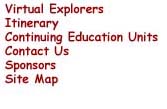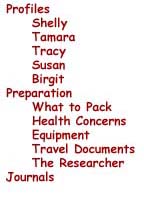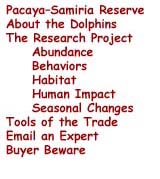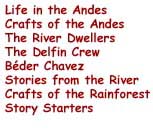|
What does a wildlife
biologist need to do to get ready to go out into the field and collect
data? How does she know what data to collect and what tools she will
need?
I finally finished my exams which are a part of the requirements of
my Ph.D. program and can now focus on my research project. The exams
are a big part of my doctorate program and I have spent a long time
preparing for them. I am glad they are behind me.
I am in the Department of Wildlife and Fisheries, and also the Marine
Mammal Research Program of Texas A&M University. I did my master's
here as well, studying river dolphins in Venezuela. I have been in the
Ph.D. program since January of 1996.
For my first year of the Ph.D. program I took classes in ecology, statistics,
aquatic biology, geography and GIS mapping. I work to pay for my classes
and support myself, and have taught an outdoor field ecology lab to
undergraduate students, helped the secretaries in the school office,
worked on a web page for the school, and worked at a natural history
museum. I have also been studying Spanish on my own and with help from
friends.
Now that I have taken my exams, I do not have to take any more classes.
Instead I can concentrate on my research. I probably have at least one
more year of data-collection in Peru, then another 9-12 months to organize
my data and write my final paper, called a dissertation.
I have an advisory committee of 5 professors who help me develop my
proposal, and who help me decide how to analyze and understand my findings.
They will decide when my work is complete. Next year I will receive
a Fulbright Fellowship, which will let me live and study in Peru for
one year.
I am really happy that I was able to have my research permit renewed
for 1999/2000. A Peruvian colleague who works with a conservation organization
in Lima helped me since a lot of this had to take place in person.
To prepare these research journeys, I read as much as I can about the
subject and talk to people who have experience in this type of work
to get their ideas and advice. Sometimes this means I am writing to
people on email that live in other parts of the world, and sometimes
we write in English or Spanish, and sometimes a mixture of both.
I keep notes of what I am doing on the river and I try to improve my
work by changing things when they do not work and trying new things.
It is really important to keep in contact with other researchers with
the same interests so we can help each other out. Often we can save
ourselves from making the same mistakes this way and sometimes as a
team we can come up with ideas that I couldn't have thought up by myself.
There is a new head of the Pacaya-Samiria Reserve--a woman--and I am
working on a letter of presentation to give to her. I want to set up
an appointment to meet her in person when I get to Iquitos later this
month.
I am a vegetarian and don't eat fish, so I am stocking up on dehydrated
vegetable protein to take with me. Definitely not gourmet but easy to
prepare without bothering the cook.
I showed the website to my grandparents and they were impressed by
their first experience with the Internet. My grandfather, 81, says now
he's not sure if he was born too early or too late, but the technology
is amazing to him. They will follow the trip on line and will even try
to send us a message while we are on the river.
Back to Top
|






